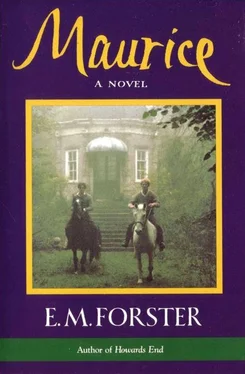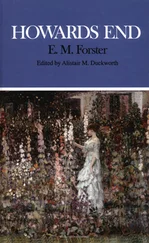The later additions to the novel necessitated by Alec are two, or rather they fall into two groups.
In the first place he has to be led up to. He must loom upon the reader gradually. He has to be developed from the masculine blur past which Maurice drives into Penge, through the croucher beside the piano and the rejecter of a tip and the haunter of shrubberies and the stealer of apricots into the sharer who gives and takes love^He must loom out of nothing until he is everything. This requires careful handling. If the reader knows too much of what's coming he may be bored. If he knows too little he may be puzzled. Take the half-dozen sentences the two exchange in the dark garden when Mr Borenius has left them, and avowal begins to hover. These sentences can reveal less or more, according to the way they are drafted. Have I drafted them appropriately? Or take Alec, when he hears the wild lone cry on his rounds: should he respond at once or — as I have finally decided — should he hesitate until it is repeated? The art called for in these problems is not of a high order, not as high as Henry James thinks, still it has to be employed if the final embrace is to be felt.
In the second place Alec has to be led down from. He has taken a risk and they have loved. What guarantee is there that such love will last? None. So their characters, their attitudes towards each other, the tests through which they are put must suggest that it may last, and the final section of the book had to be much longer than originally planned. The British Museum chapter had to be extended and a whole new chapter inserted after it — the chapter of their passionate and distracted second night, where Maurice comes further into the open and Alec daren't. In the original draft I had only implied all this. Similarly, after Southampton, when Alec too had risked all, I hadn't brought them to their final reunion. All this had to be written out, so that they might be ascribed the fullest possible knowledge of each other. Not until some dangers and some threats had been surmounted could the curtain prepare to fall.
The chapter after their reunion, where Maurice ticks off Clive, is the only possible end to the book. I did not always think so, nor did others, and I was encouraged to write an epilogue. It took the form of Kitty encountering two woodcutters some years later and gave universal dissatisfaction. Epilogues are for Tolstoy. Mine partly failed because the novel's action-date is about 1912, and "some years later" would plunge it into the transformed England of the First World War.
The book certainly dates and a friend has recently remarked that for readers today it can only have a period interest. I wouldn't go as far as that, but it certainly dates — not only because of its endless anachronisms — its half-sovereign tips, pianola-records, norfolk jackets, Police Court News, Hague Conferences, Libs and Rads and Terriers, uninformed doctors and undergraduates walking arm in arm, but for a more vital reason: it belongs to an England where it was still possible to get lost. It belongs to the last moment of the greenwood. The Longest Journey belongs there too, and has similarities of atmosphere. Our greenwood ended catastrophically and inevitably. Two great wars demanded and bequeathed regimentation which the public services adopted and extended, science lent her aid, and the wildness of our island, never extensive, was stamped upon and built over and patrolled in no time. There is no forest or fell to escape to today, no cave in which to curl up, no deserted valley for those who wish neither to reform nor corrupt society but to be left alone. People do still escape, one can see them any night at it in the films. But they are gangsters not outlaws, they can dodge civilization because they are part of it.
Homosexuality
Note in conclusion on a word hitherto unmentioned. Since Maurice was written there has been a change in the public attitude here: the change from ignorance and terror to familiarity and contempt. It is not the change towards which Edward Carpenter had worked. He had hoped for the generous recognition of an emotion and for the reintegration of something primitive into the common stock. And I, though less optimistic, had supposed that knowledge would bring understanding. We had not realized that what the public really loathes in homosexuality is not the thing itself but having to think about it. If it could be slipped into our midst unnoticed, or legalized overnight by a decree in small print, there would be few protests. Unfortunately it can only be legalized by Parliament, and Members of Parliament are obliged to think or to appear to think. Consequently the Wolfenden recommendations will be indefinitely rejected, police prosecutions will continue and Clive on the bench will continue to sentence Alec in the dock. Maurice may get off.
September 1960
A Note on the Text
With a small number of exceptions, the 1960 typescript has been faithfully followed, even where it reads a trifle oddly — as when Alec Scudder, batting in a cricket match, is made to "resign" (i.e., retire), or "Whitmannic" is used in place of "Whitmanesque", or some sentences in the Terminal Note need revising in the light of the Sexual Offences Act of 1967. The exceptions are as follows.
1. The surname of one of the characters has, on the author's written instructions, been altered throughout, and one or two contingent changes made.
2. Spelling, punctuation and capitalization have, where no nuance is involved, been regularized in accordance with normal practice today.
3. A number of obvious typing errors (or in some cases possibly slips of the pen) have been corrected.
4. Rather more diffidently, the following readings have been adopted with the aim of correcting what appear to be either typing errors or slips on Forster's part:
PAGE / LINE / BEADING ADOPTED / TYPESCRIPT
37 / 8 / but he held… Durham / but held… he
39 / 20 / watching for Durham / watching Durham
42 / 25 / was / is
61 / 21 / kicking / kissing
103 / 16 / coasting (hooting?) / hoosting or boosting
169 / 5–6 / evidently he had / had evidently
183 / 11–12 / that he should telephone next week / for next week
5. Finally, on page 116, a famous phrase from Sophocles ("Not to be born is best" — Oedipus Coloneus, 1224 — 5) has been inserted where the 1960 typescript has a blank space, and an earlier typescript supplies a slightly inaccurate version of the quotation.












